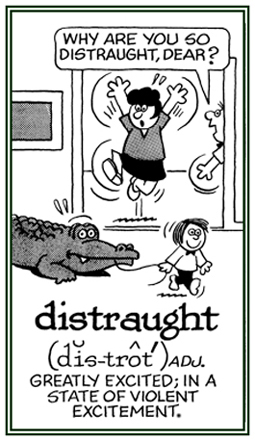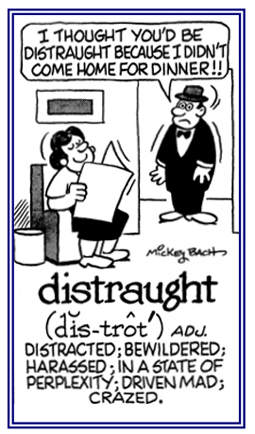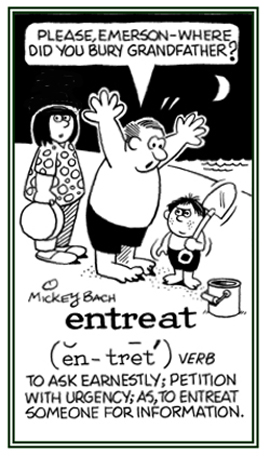tra-, tract-, trac-, -tractive, -traction, -tracting, treat-, trai-
(Latin: drag, draw together; a drawing out or pulling)
2. Descriptive of being mentally deranged; crazed, or insane: The distraught passenger on the subway was talking loudly to herself and waving a book at the other people sitting near her.


Go to this Word A Day Revisited Index
so you can see more of Mickey Bach's cartoons.
Electricity is also used in the movement of vehicles in other ways, but these forms are not usually included in the category of electric traction; examples include, battery-powered electric automobiles, battery-propelled vans for city delivery or warehouse use, and modern diesel-electric locomotives in which the wheels are driven by electric motors powered by diesel engines.
Its therapeutic effect depends on the heat from the electric lights.
2. The capacity of muscular tissue for contraction in response to electric stimulation.
Electroconvulsive therapy is primarily used when rapid definitive response is required for either medical or psychiatric reasons; such as, for a patient who is extremely suicidal and when the risks of other treatments outweigh the risk of ECT.
There is a use for this type of treatment with specific types of mental illness; especially, if acute depression and suicidal intentions are present.
Such convulsions can sometimes treat clinical depressions which can not be treated with medication.
2. A treatment of certain mental disorders by passing an electric current of 85-110 volts through the brain.
3. The use of electric current to produce unconsciousness or convulsions in the treatment of psychotic disorders; especially, depressive disorders.
4. The induction of convulsive seizures by the passing of an electric current through the brain.
It is sometimes used in the treatment of acute depression.
2. The electrostatic force of attraction exerted by one charged particle onto another charged particle of the opposite sign.
3. The tendency of bodies to draw together when carrying opposite charges of electricity.

Go to this Word A Day Revisited Index
so you can see more of Mickey Bach's cartoons.
Tim's mother had to use tweezers to extract a splinter from his thumb.
2. To get something despite a resistance: Jack finally extracted a promise from his sister not to tell their parents that he had thrown a ball through the window by mistake!3. To obtain from a substance by chemical or mechanical action; as, by pressure, distillation, or evaporation: In biology class at school, the students learned that caffeine could be extracted from coffee beans by a process known as water processing.
4. To remove for separate consideration or publication; to excerpt: A hacker was able to extract and transfer important data from Rebecca’s computer to his own.
5. To derive or to obtain information from a source or to deduce a principle or doctrine; to construe a meaning: Susan was hoping to extract some useful background data from the internet to include in her article for the newspaper.
6. To derive pleasure from some source or situation: Bob extracted so much enjoyment from reading his new book that he wanted to get another one by the same author.
7. Etymology: borrowed from French extraction; from Latin extractionem from extractio; from the stem of Latin extrahere, "to pull out"; from ex-, "out" + trahere, "to pull".
2. The act of copying or removing a passage from a text: Mildred was able to get certain extractions clarifying the life of the author from his memoirs.
3. The removal of a tooth or teeth: Sally had to go to the dentist to have a dental extraction performed because of a severe case of molar decay.
Extractions of one or more teeth may be performed when a tooth is severely decayed, when an abscess has formed, or when a tooth is too badly broken to be repaired by crowning or root-canal treatment.
4. In chemistry, the separation of a substance from a mixture by dissolving one or more of the components in a solvent: There are different types of extractions, one of which is decoction, which is the removal of water-soluable drug substances by boiling them in water.5. The ethnic origin or the original nationality of someone's ancestors: Jane's husband was of Spanish extraction.


